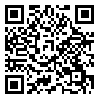Volume 23, Issue 2 (6-2020)
Hakim 2020, 23(2): 189-200 |
Back to browse issues page
Download citation:
BibTeX | RIS | EndNote | Medlars | ProCite | Reference Manager | RefWorks
Send citation to:



BibTeX | RIS | EndNote | Medlars | ProCite | Reference Manager | RefWorks
Send citation to:
salarianzadeh M H, latifi jaliseh S. Challenges of Governance Structure in the Ministry of Health, Treatment, and Medical Education of Iran Based on Network Structure Model. Hakim 2020; 23 (2) :189-200
URL: http://hakim.tums.ac.ir/article-1-1993-en.html
URL: http://hakim.tums.ac.ir/article-1-1993-en.html
1- Physician, Master of Health Services Management, Ministry of Health, Treatment and Medical Education.
2- Phd of Public Management, Kharazmi University of Tehran. ,latifisalimeh@yahoo.com
2- Phd of Public Management, Kharazmi University of Tehran. ,
Abstract: (1070 Views)
Introduction: In the present study, structural challenges in the governance system of the Ministry of Health, Treatment, and Medical Education of Iran were analyzed based on the network structure model.
Methods: The present qualitative study was conducted using a meta-combined approach. The study used the findings of 19 qualitative studies, conducted between 2001 and 2018, and semi-structured interviews with 14 non-randomly selected experts of the Iranian health system. The Kapa-Cohen index was used to calculate the reliability, which was 80%. Also, the Waltz-Basel method was used to assess the content validity of the extracted indices, which was calculated to be 85%. Through the content analysis of the articles and interviews with experts, the structural challenges of the governance system were classified into seven dimensions, including policy-making and decision-making challenges, legal challenges, organizational challenges, managerial challenges, communication challenges, financial challenges, and regulatory challenges.
Results: The findings showed that important challenges in the current governance structure of the Ministry of Health, Treatment, and Medical Education of Iran include the instability of managers, inconsistent speed of policy-making and changes in society, the separated activity of the Health Deputy and Treatment Deputy of the Ministry, lack of defined inter-sectoral cooperation, lack of transparency, lacked knowledge of the requirements of collective decision-making in health policy-makers, the lacked use of evidence-based policy-making, inadequate budget system, and lack of control over the private sector.
Conclusion: According to the challenges and their importance, health policy-makers and planners must provide practical and applicable solutions to address the challenges of the current governance structure.
Methods: The present qualitative study was conducted using a meta-combined approach. The study used the findings of 19 qualitative studies, conducted between 2001 and 2018, and semi-structured interviews with 14 non-randomly selected experts of the Iranian health system. The Kapa-Cohen index was used to calculate the reliability, which was 80%. Also, the Waltz-Basel method was used to assess the content validity of the extracted indices, which was calculated to be 85%. Through the content analysis of the articles and interviews with experts, the structural challenges of the governance system were classified into seven dimensions, including policy-making and decision-making challenges, legal challenges, organizational challenges, managerial challenges, communication challenges, financial challenges, and regulatory challenges.
Results: The findings showed that important challenges in the current governance structure of the Ministry of Health, Treatment, and Medical Education of Iran include the instability of managers, inconsistent speed of policy-making and changes in society, the separated activity of the Health Deputy and Treatment Deputy of the Ministry, lack of defined inter-sectoral cooperation, lack of transparency, lacked knowledge of the requirements of collective decision-making in health policy-makers, the lacked use of evidence-based policy-making, inadequate budget system, and lack of control over the private sector.
Conclusion: According to the challenges and their importance, health policy-makers and planners must provide practical and applicable solutions to address the challenges of the current governance structure.
| Please cite this article as follows: Salarianzadeh M.H, Latifi Jaliseh S. Challenges of governance structure in the ministry of health, treatment, and medical education of Iran based on network structure model. Hakim Health Sys Res. 2020; 23(2): 189-200. |
*Corresponding Author: kharazmi university, Tehran, postal code: 1599964511, Tell: (+98)9112430186, E-mail: latifisalimeh@yahoo.com
Keywords: Hierarchical Structure, Network Structure, Ministry of Health and Medical Education, Meta-synthesis
Type of Study: Original |
Subject:
General
Received: 2020/01/28 | Accepted: 2020/06/30 | Published: 2020/06/30
Received: 2020/01/28 | Accepted: 2020/06/30 | Published: 2020/06/30
Send email to the article author
| Rights and permissions | |
 |
This work is licensed under a Creative Commons Attribution-NonCommercial 4.0 International License. |





